- Home
- Deborah Harkness
The Book of Life Page 40
The Book of Life Read online
Page 40
"I haven't seen or sensed anything." Amira smiled at Fernando with fondness. "It has been too long since we've seen each other."
"Make Diana some akuri on toast and I will forgive you," Fernando said with an answering grin. "The scent alone will transport me to heaven."
After a round of introductions, I found myself in the tiny room where we had taken our family meals in 1590. There was no map on the wall, but a fire burned cheerily, dispelling some of the dampness.
Amira put plates of scrambled eggs and toast before us, along with bowls of rice and lentils. Everything was fragrant with chilies, mustard seed, lime, and coriander. Fernando hovered over the dishes, inhaling the aromatic steam.
"Your kanda poha reminds me of that little stall we visited on our way to Gharapuri to see the caves, the one that had the chai made with coconut milk." He inhaled deeply.
"It should," Amira said, sticking a spoon in the lentils. "He was using my grandmother's recipe. And I ground the rice the traditional way, in an iron mortar and pestle, so it is very good for Diana's pregnancy."
In spite of my insistence that I was not hungry, there was something downright alchemical in the effect that cumin and lime had on my appetite. Soon I was looking down at an empty plate.
"That's more like it," Gallowglass said with satisfaction. "Now, why don't you lie on the settle and close your eyes. If you're not comfortable there, you can always rest on the bed in Pierre's old office, or your own bed, come to think of it."
The settle was oaken, heavily carved, and designed to discourage loafing. It had been in the formal parlor during my previous life in the house and had simply drifted a few rooms to provide a seat underneath the window. The stack of papers on the end of it suggested that this was where Amira sat in the mornings to catch up on the news.
I was beginning to understand how Matthew treated his houses. He lived in them, left them, and returned decades or centuries later without touching the contents other than to slightly rearrange the furniture. It meant he owned a series of museums, rather than proper homes. I thought of the memories that awaited me in the rest of the house--the great hall where I'd met George Chapman and Widow Beaton, the formal parlor where Walter Raleigh had discussed our predicament under the watchful eyes of Henry VIII and Elizabeth I, and the bedchamber where Matthew and I had first set foot in the sixteenth century.
"The settle will be fine," I said hastily. If Gallowglass would surrender his leather jacket and Fernando his long woolen coat, the carved roses on the backrest wouldn't jab into my side too sharply. To make my desire real, the pile of coats by the fireplace arranged themselves into a makeshift mattress. Surrounded by scents of bitter orange, sea spray, lilac, tobacco, and narcissus, I felt my eyes grow heavy and I drifted into sleep.
*
"No one has caught so much as a glimpse of him," Amira said, her low voice waking me from my nap.
"Still, you shouldn't be teaching classes so long as Benjamin poses a risk to your safety." Fernando sounded uncharacteristically firm. "What if he were to walk through the front door?"
"Benjamin would find himself facing two dozen furious daemons, vampires, and witches, that's what," Amira replied. "Matthew told me to stop, Fernando, but the work that I'm doing seems more important now than ever."
"It is." I swung my legs off the settle and sat up, rubbing the sleep from my eyes. According to the clock, forty-five minutes had passed. It was impossible to gauge the passage of time from the changing light, since we were still entombed in fog.
Sarah called to Marthe, who brought tea. It was mint and rose hips, with none of the caffeine that would have made me more alert, but it was blessedly hot. I'd forgotten how cold sixteenth-century homes could be.
Gallowglass made a spot for me close to the fire. It saddened me to think of all that concern directed at me. He was so worthy of being loved; I didn't want him to be alone. Something in my expression must have revealed what was on my mind.
"No pity, Auntie. The winds do not always blow as the ship desires," he murmured, tucking me into my chair.
"The winds do what I tell them to do."
"And I plot my own course. If you don't stop clucking over me, I'll tell Matthew what you're up to and you can deal with two royally pissed-off vampires instead of one."
It was a prudent time to change the subject.
"Matthew is establishing his own family, Amira," I said, turning to our host. "It will have all kinds of creatures in it. Who knows, we might even let in humans. We'll need all the yoga we can get if he succeeds." I paused as my right hand began to tingle and pulse with color. I studied it for a moment in silence, then came to a decision. I wished the stiff leather portfolio that Phoebe had bought to protect the pages from the Book of Life was here at the table and not across the room. Despite the nap, I was still exhausted.
The portfolio appeared on a nearby table.
"Abracadabra," Fernando murmured.
"Since you live at Matthew's house, it only seems right to explain why we've all descended on you," I said to Amira. "You've probably heard stories about the witches' first grimoire?"
Amira nodded. I handed her the two pages we'd already gathered.
"These come from that book--the same book the vampires call the Book of Life. We think another page is in the possession of someone named T. J. Weston, living in Chipping Weston. Now that we're all fed and watered, Phoebe and I are going to see if he or she is amenable to selling it."
Ysabeau and Phoebe appeared right on cue. Phoebe was as white as a sheet. Ysabeau looked mildly bored.
"What's wrong, Phoebe?" I asked.
"There's a Holbein. In the bathroom." She pressed her hands against her cheeks. "A small oil painting of Thomas More's daughter, Margaret. It shouldn't be hung over a toilet!"
I was beginning to understand why Matthew found my constant objections to the way his family treated their library books tiresome.
"Stop being so prudish," Ysabeau said with mild irritation. "Margaret was not the kind of woman to be bothered by a bit of exposed flesh."
"You think--That is--" Phoebe sputtered. "It's not the decorum of the situation that troubles me, but the fact that Margaret More might tumble into the loo at any moment!"
"I understand, Phoebe." I tried to sound sympathetic. "Would it help to know that there are other, far larger and more important works by Holbein in the parlor?"
"And upstairs. The whole sainted family is in one of the attics." Ysabeau pointed heavenward. "Thomas More was an arrogant young man, and he did not grow more humble with age. Matthew did not seem to mind, but Thomas and Philippe nearly came to blows on several occasions. If his daughter drowns in the lavatory, it will serve him right."
Amira began to giggle. After a shocked look, Fernando joined in. Soon we were all laughing, even Phoebe.
"What is all this noise? What has happened now?" Marthe eyed us suspiciously from the door.
"Phoebe is adjusting to being a de Clermont," I said, wiping at my eyes.
"Bonne chance," Marthe said. This only made us laugh harder.
It was a welcome reminder that, different though we might be, we were a family of sorts--no stranger or more idiosyncratic than thousands that had come before us.
"And these pages you've brought--are they from Matthew's collections as well?" Amira said, picking up the conversation where we'd abandoned it.
"No. One of them was given to my parents, and the other was in the hands of Matthew's grandson, Andrew Hubbard."
"Hmm. So much fear." Amira's eyes lost focus. She was a witch with significant insight and empathic powers.
"Amira?" I looked at her closely.
"Blood and fear." She shuddered, not seeming to hear me. "It's in the parchment itself, not just the words."
"Should I stop her?" I asked Sarah. In most situations it was best to let a witch's second sight play itself out, but Amira had slipped too quickly into her vision of another time and place. A witch might wander so far into a thicket of images and feeling
s that she couldn't find her way out of them.
"Absolutely not," Sarah said. "There are two of us to help her if she gets lost."
"A young woman--a mother. She was killed in front of her children," Amira murmured. My stomach flipped. "Their father was already dead. When the witches brought her husband's body to her, they dropped it at her feet and made her look at what they had done to him. It was she who first cursed the book. So much knowledge, lost forever." Amira's eyes drifted closed. When they opened again, they were shining with unshed tears. "This parchment was made from the skin that stretched over her ribs."
I knew that the Book of Life had dead creatures in it, but I never imagined I would know anything more about them than whatever their DNA was capable of revealing. I bolted for the door, stomach heaving. Corra flapped her wings in agitation, turning this way and that to stabilize her position, but there was little room for her to maneuver thanks to the growing presence of the twins.
"Shh. That will not be your fate. I promise you," Ysabeau said, catching me in her arms. She was cool and solid, her strength evident in spite of her graceful build.
"Am I doing the right thing to try to mend this broken book?" I asked once the roiling in my guts had stopped. "And to do it without Matthew?"
"Right or wrong, it must be done." Ysabeau smoothed back my hair, which had tumbled forward, obscuring my face. "Call him, Diana. He would not want you to suffer like this."
"No." I shook my head. "Matthew has his job to do. I have mine."
"Let us finish it then," Ysabeau said.
*
Chipping Weston was the type of picturesque English village where novelists liked to set murder mysteries. It looked like a postcard or a film set, but it was home to several hundred people who lived in thatched houses spread out over a handful of narrow lanes. The village green had retained its stocks for punishing its citizens found guilty of some wrongdoing, and there were two pubs so that even if you had a falling-out with half your neighbors, you'd still have a place to go where you could have your evening pint.
The Manor House was not difficult to find.
"The gates are open." Gallowglass cracked his knuckles.
"What is your plan, Gallowglass? Running at the front door and battering it down with your bare hands?" I climbed out of Leonard's car. "Come on, Phoebe. Let's go ring the bell."
Gallowglass was behind us as we walked straight through the open front gates and skirted the round stone planter that I suspected had been a fountain before it was filled in with soil. Standing in the middle were two box trees clipped to resemble dachshunds.
"How extraordinary," Phoebe murmured, eyeing the green sculptures.
The door to the manor was set in the middle of a bank of low windows. There was no bell, but an iron knocker--also shaped like a dachshund--had been inexpertly affixed to the stout Elizabethan panels. Before Phoebe could give me a lecture about the preservation of old houses, I lifted the dog and rapped sharply.
Silence.
I rapped again, putting a bit more weight into it.
"We are standing in plain view of the road," Gallowglass growled. "That's the sorriest excuse for a wall I've ever seen. A child could step over it."
"Not everybody can have a moat," I said. "I hardly think Benjamin has ever heard of Chipping Weston, never mind followed us here."
Gallowglass was unconvinced and continued to look around like an anxious owl.
I was about to rap again when the door was flung open. A man wearing goggles and a parachute slung around his shoulders like a cape stood in the entrance. Dogs swarmed around his feet, wriggling and barking.
"Whenever have you been?" The stranger engulfed me in a hug while I tried to sort out what his strange question meant. The dogs leaped and frolicked, excited to meet me now that their master had signaled his approval. He let me go and lifted his goggles, his nudging stare feeling like a buss of welcome.
"You're a daemon," I said unnecessarily.
"And you're a witch." With one green eye and one blue, he studied Gallowglass. "And he's a vampire. Not the same one you had with you before, but still big enough to replace the lightbulbs."
"I don't do lightbulbs," Gallowglass said.
"Wait. I know you," I said, sifting through the faces in my memory. This was one of the daemons I'd seen in the Bodleian last year when I'd first encountered Ashmole 782. He liked lattes and taking apart microfilm readers. He always wore earbuds, even when they weren't attached to anything. "Timothy?"
"The same." Timothy turned his eyes to me and cocked his fingers and thumbs so they looked like six-shooters. He was, I noticed, still wearing mismatched cowboy boots, but this time one was green and the other blue--to match his eyes, one presumed. He clicked his tongue against his teeth. "Told you, babe: You're the one."
"Are you T. J. Weston?" Phoebe asked, trying to make her voice heard above the din of yelping, wriggling dogs.
Timothy stuffed his fingers in his ears and mouthed, "I can't hear you."
"Oy!" Gallowglass shouted. "Shut your gobs, little yappers."
The barking stopped instantly. The dogs sat, jaws open and tongues lolling, and looked at Gallowglass adoringly. Timothy removed a finger from one of his ears.
"Nice," the daemon said with a low whistle of appreciation. The dogs immediately started barking again.
Gallowglass bundled us all inside, muttering darkly about sight lines and defensive positions and possible hearing damage to Apple and Bean. Peace was achieved once he got down on the floor in front of the fireplace and let the dogs scramble all over him, licking and burrowing as if their pack's alpha had been returned to them after a long absence.
"What are their names?" Phoebe inquired, trying to count the number of tails in the squirming mound.
"Hansel and Gretel, obviously." Timothy looked at Phoebe as though she were hopeless.
"And the other four?" Phoebe asked.
"Oscar. Molly. Rusty. And Puddles." Timothy pointed to each dog in turn.
"He likes to play outside in the rain?"
"No," Timothy replied. "She likes to piddle on the floor. Her name was Penelope, but everybody in the village calls her Puddles now."
A graceful segue from this subject to the Book of Life was impossible, so I plunged forward. "Did you buy a page from an illuminated manuscript that has a tree on it?"
"Yep." Timothy blinked.
"Would you be willing to sell it to me?" There was no point in being coy.
"Nope."
"We're prepared to pay handsomely for it." Phoebe might not like the de Clermonts' casual indifference to where pictures were hung, but she was beginning to see the benefits of their purchasing power.
"It's not for sale." Timothy ruffled the ears of one of the dogs who then returned to Gallowglass and began to gnaw on the toe of his boot.
"Can I see it?" Perhaps Timothy would let me borrow it, I thought.
"Sure." Timothy divested himself of the parachute and strode out of the room. We scrambled to keep up.
He led us through several rooms that had clearly been designed for different purposes from the ones they were now used for. A dining room had a battered drum kit set up in the center with DEREK AND THE DERANGERS painted on the bass-drum head, and another room looked like an electronics graveyard except for the chintz sofas and beribboned wallpaper.
"It's in there. Somewhere," Timothy said, gesturing at the next room.
"Holy Mother of God," Gallowglass said, astonished.
"There" was the former library. "Somewhere" covered a multitude of possible hiding places, including unopened shipping crates and mail, cardboard cartons full of sheet music going back to the 1920s, and stacks and stacks of old newspapers. There was a large collection of clock faces of all sizes, descriptions, and vintages, too.
And there were manuscripts. Thousands of manuscripts.
"I think it's in a blue folder," Timothy said, scratching his chin. He had obviously started shaving at some point earlier in t
he day but only partially completed the task, leaving two grizzled patches.
"How long have you been buying old books?" I asked, picking up the first one that came to hand. It was an eighteenth-century student science notebook, German, and of no particular value except to a scholar of Enlightenment education.
"Since I was thirteen. That's when my gran died and left me this place. My mom left when I was five, and my dad, Derek, died of an accidental overdose when I turned nine, so it was just me and Gran after that." Timothy looked around the room fondly. "I've been restoring it ever since. Do you want to see my paint chips for the gallery upstairs?"
"Maybe later," I said.
"Okay." His face fell.
"Why do manuscripts interest you?" When trying to get answers from daemons and undergraduates, it was best to ask genuinely open-ended questions.
"They're like the house--they remind me of something I shouldn't forget," Timothy said, as though that explained everything.
"With any luck one of them will remind him where he put the page from your book," Gallowglass said under his breath. "If not, it's going to take us weeks to go through all this rubbish."
We didn't have weeks. I wanted Ashmole 782 out of the Bodleian and stitched back together so that Matthew could come home. Without the Book of Life, we were vulnerable to the Congregation, Benjamin, and whatever private ambitions Knox and Gerbert might harbor. Once it was safely in our possession, they would all have to deal with us on our terms--scion or no scion. I pushed up my sleeves.
"Would it be all right with you, Timothy, if I used magic in your library?" It seemed polite to ask.
"Will it be loud?" Timothy asked. "The dogs don't like noise."
"No," I said, considering my options. "I think it will be completely silent."
"Oh, well, that's okay, then," he said, relieved. He put his goggles back on for additional security.
"More magic, Auntie?" Gallowglass's eyebrows lowered. "You've been using an awful lot of it lately."
"Wait until tomorrow," I murmured. If I got all three missing pages, I was going to the Bodleian. Then it was gloves-off time.
A flurry of papers rose from the floor.
"You've started already?" Gallowglass said, alarmed.
"No," I said.
"Then what's causing the ruckus?" Gallowglass moved toward the agitated pile.
A tail wagged from between a leather-bound folio and a box of pens.

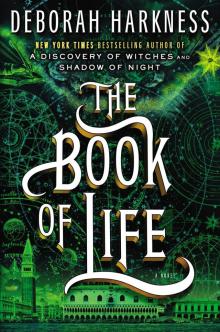 The Book of Life
The Book of Life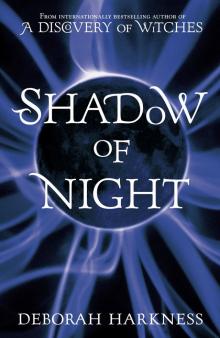 Shadow of Night
Shadow of Night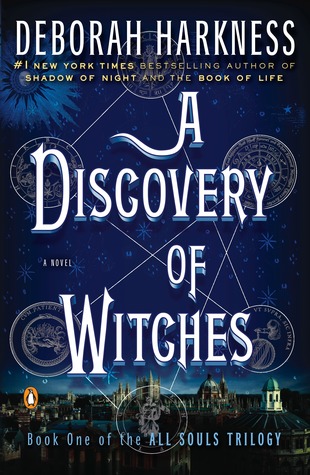 A Discovery of Witches
A Discovery of Witches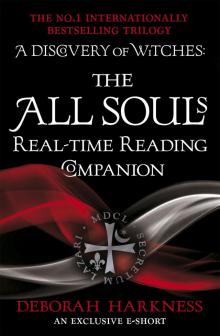 The All Souls Real-Time Reading Companion
The All Souls Real-Time Reading Companion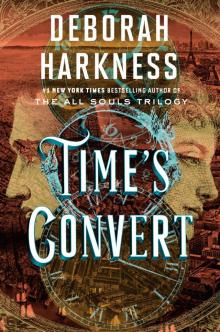 Time's Convert
Time's Convert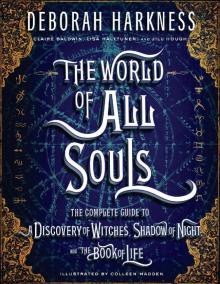 The World of All Souls
The World of All Souls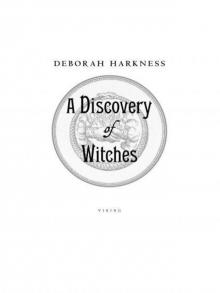 A Discovery of Witches: A Novel (All Souls Trilogy)
A Discovery of Witches: A Novel (All Souls Trilogy)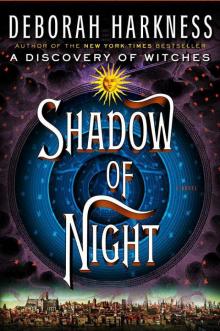 Shadow of Night: A Novel
Shadow of Night: A Novel